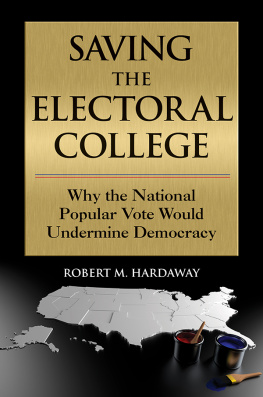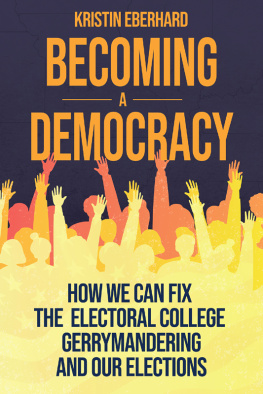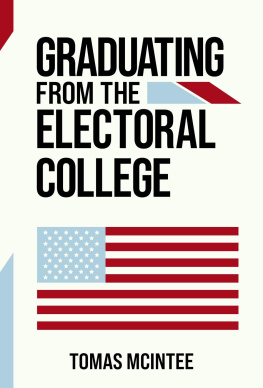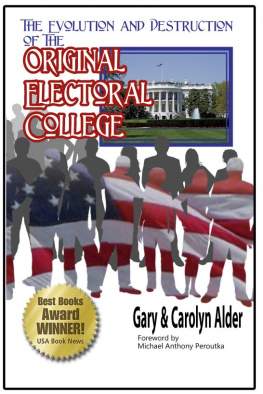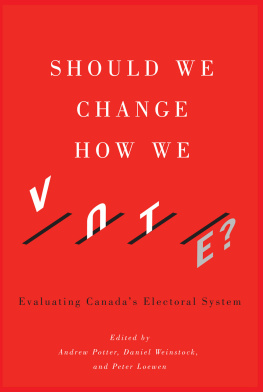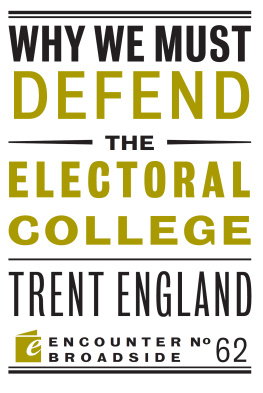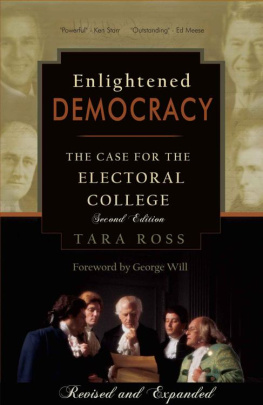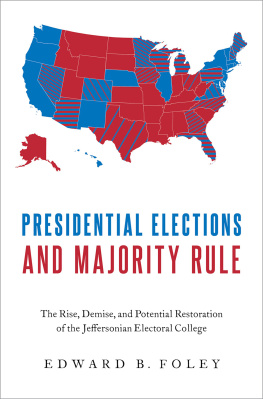Saving the Electoral College
Saving the Electoral College
Why the National Popular Vote Would Undermine Democracy
Robert M. Hardaway

Copyright 2019 by Robert M. Hardaway
All rights reserved. No part of this publication may be reproduced, stored in a retrieval system, or transmitted, in any form or by any means, electronic, mechanical, photocopying, recording, or otherwise, except for the inclusion of brief quotations in a review, without prior permission in writing from the publisher.
Library of Congress Cataloging-in-Publication Data
Names: Hardaway, Robert M., 1946- author.
Title: Saving the electoral college : why the national popular vote would undermine democracy / Robert M. Hardaway.
Description: Santa Barbara, California : Praeger, an imprint of ABC-CLIO, LLC, [2019] | Includes bibliographical references and index.
Identifiers: LCCN 2019016226 (print) | LCCN 2019021749 (ebook) | ISBN 9781440869952 (print : alk. paper) | ISBN 9781440869969 (ebook)
Subjects: LCSH: Electoral collegeUnited States. | PresidentsUnited StatesElection. | Direct electionUnited States. | DemocracyUnited States.
Classification: LCC JK529 (ebook) | LCC JK529 .H375 2019 (print) | DDC 324.6/3dc23
LC record available at https://lccn.loc.gov/2019016226
ISBN: 978-1-4408-6995-2 (print)
978-1-4408-6996-9 (ebook)
23 22 21 20 19 1 2 3 4 5
This book is also available as an eBook.
Praeger
An Imprint of ABC-CLIO, LLC
ABC-CLIO, LLC
147 Castilian Drive
Santa Barbara, California 93117
www.abc-clio.com
This book is printed on acid-free paper 
Manufactured in the United States of America
Dedicated
to
Judy Trejos
Contents
Preface
The facts of the matter are that the system of [direct election] will greatly increase the likelihood of a minority president.... [It] would break down the federal system under which most states entered the union, which provides a system of checks and balances to insure that no area or group shall obtain too much power.
Senator John F. Kennedy
This government is not completely consolidated, nor is it entirely Federal.... Who are the parties to it? The peoplenot the people as comprising one great body, but the people as composing 13 sovereignties.
James Madison
I first became interested in the Electoral College as a high school student at St. Albans School in Washington, D.C. Every Thursday evening we would meet in government class in which students would engage in mock congressional debate on an issue of national interest, proposing bills, arguing for or against them, and then voting. One of the bills proposed was to abolish the Electoral College. I remember well one classmate of mine in that class by the name of Al Gore. Of course, none of us at that time knew the enormity that this issue would play in the future career of our classmate when he became a candidate for president in the 2000 election.
This government class debate was in large part a reenactment of a real-life debate held just a few years before in the U.S. Senate in March 1956. As documented in the Congressional Record,ritualnamely, to abolish the Electoral College. These bidecade rituals inevitably involve attacks on the Founding Fathers plan for presidential elections and the ratification of that plan by the 13 original colonies.
At issue in the Senate debates of 1956 was Joint Resolution 31, which proposed a rewriting of major portions of the U.S. Constitution in order to impose upon the American people a so-called direct election scheme. Virtually alone against this cabal of senators was a young senator, John F. Kennedy, who in the manner of Jimmy Stewart in Mr. Smith Goes to Washington gave a speech in the U.S. Senate that now serves as one of the most valiant and dramatic cases for saving the Electoral College that has ever been made in U.S. history.
To one senators tired claim that the Electoral College is somehow undemocratic, Kennedy firmly responded that while direct election purports to be more democratic, [it] would in fact increase the power and encourage splinter parties, with the result that presidents would be elected with only a small percentage of the popular vote.
History has shown Kennedys concerns to be only too prescient. One might ask the exasperated voters of France, who in their 2017 direct election were told to select from a field of 11 candidates. Without the channeling effects of an Electoral College, the 2 established major party candidates were nudged out of the ensuing runoff by less than 2 percent of the vote, with the results that voters were faced with a choice between an extreme right-wing candidate who received less than 21 percent of the vote and an unknown maverick who received only 23 percent of the vote. Since in a runoff one candidate must by predetermined contrivance receive a majority, this is what passed as democracy despite the fact that both candidates were opposed by almost two-thirds of the electorate. In the runoff, over 600,000 voters expressed their outrage with this poor imitation of democracy by casting a ballot blancthe blank ballot.
To unsubstantiated claims that because of our two-party system similar affronts to democracy could not exist in America under a French- or Russian-style direct electionthat is, an election in which voters must vote directly for a candidate from a list of candidates representing a number of different parties, followed by a runoffKennedy understood and explained that similar affronts to democracy certainly could indeed occur in the absence of the channeling effects of the Electoral College. This is because it is the Electoral College itself that ensures the stability of a two-party system in which a true majority or substantial plurality is required to elect a president. As he explained, the facts of the matter are that a system [of direct election] will greatly increase the likelihood of a minority president.France came within a whisker of electing a hard right-wing candidate opposed by 80 percent of the electorate. As it was, the unknown maverick candidate who won with only 23 percent of the vote in the first-stage election was the subject of violent countrywide demonstrations in 2018.
Perhaps even more important than how a Russian-style direct election would undermine American democracy is that without unanimous consent of all the states, any scheme to deprive states of equal suffrage in the Senate, upon which the allocation of electors in the Electoral College is based, would be unconstitutional. This is because Article V of the Constitution absolutely forbids the use of constitutional amendment as a means to deprive any state of its equal suffrage in the Senateupon which the allocation of electoral votes in the Electoral College is basedwithout the unanimous consent of all the states. Consent of two-thirds of Congress and three-fourths of the states is simply not sufficient according to Article V to deprive any state of either its equal suffrage in the Senate or its representation in the Electoral College, which is based on that equal suffrage. Kennedy implicitly recognized this when he noted that states only agreed to enter the union if they were so absolutely guaranteed of their equal suffrage in the Senate upon which their electors are allocated in the Electoral College. He also recognized that if you tamper with the Constitution by changing the balance of power of one of the solar system [of government power] it is necessary to consider all the others.
Next page
